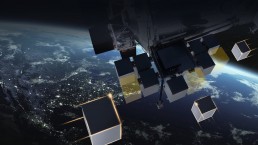October 29, 2020
Airbus and Launchspace Technologies Corporation Sign Mission Contract for a Payload on Bartolomeo

October 29, 2020
Airbus and Launchspace Technologies Corporation Sign Mission Contract for a Payload on Bartolomeo



“We are extremely pleased to be able to demonstrate our technology on Bartolomeo. The platform’s ‘front row’ position in the flight direction of the Space Station is perfectly suited for our purpose: Our sensors will be directly exposed to the Space environment, which will give us highly realistic and accurate measurement results.”Launchspace’s CEO John Baumann. In addition, LTC plans to make use of one of the key features of the Bartolomeo Service: At the end of the mission, the payload will be returned to Earth for a post-flight inspection of the debris impacts. The Launchspace Debris Impact Pads will be hosted using the ArgUS Multi-Payload Carrier, designed to co-accommodate smaller payloads on one Bartolomeo payload site. The ArgUS Carrier has been developed and is currently in construction at Airbus DS Space Systems Inc. in Houston, Texas.
“The ArgUS Carrier is a key addition to our Bartolomeo Service, It enables us to offer our unique Bartolomeo Service also to customers that wish to fly smaller payloads, often on a limited budget.”Debra Facktor, Head of U.S. Space Systems, Airbus U.S. Space and Defense. The Bartolomeo platform, launched from the Kennedy Space Center in Florida, was installed on the ISS Columbus module on 1st April, 2020. Bartolomeo is an investment of Airbus into the ISS infrastructure, enabling hosting of up to twelve external payloads in the environment of Space. Bartolomeo is suitable for many types of missions, including Earth observation, environmental and climate research, robotics, material sciences and astrophysics. It provides sought-after payload-hosting capabilities for customers and researchers to test space technologies, verify a new space business approach, conduct scientific experiments in microgravity or enter into in-space manufacturing endeavors. Launch opportunities are available on every servicing mission to the ISS, which occur about every three months. The payload accommodation allows slots for a wide range of payload mass, from 11 to 990 pounds. As an evolution of the platform, Airbus will provide optical data downlink capacity of one to two terabytes per day. Payloads can be prepared and ready to operate within one and a half years after contract signature. Payload sizes, interfaces, preparation before launch and integration processes are largely standardized. This reduces lead times and saves costs significantly compared to traditional mission costs. Airbus offers this easy access to space as an all-in-one mission service. This includes technical support in preparing the payload mission; launch and installation; operations and data transfer; and an optional return to Earth.
“We are extremely pleased to be able to demonstrate our technology on Bartolomeo. The platform’s ‘front row’ position in the flight direction of the Space Station is perfectly suited for our purpose: Our sensors will be directly exposed to the Space environment, which will give us highly realistic and accurate measurement results.”Launchspace’s CEO John Baumann. In addition, LTC plans to make use of one of the key features of the Bartolomeo Service: At the end of the mission, the payload will be returned to Earth for a post-flight inspection of the debris impacts. The Launchspace Debris Impact Pads will be hosted using the ArgUS Multi-Payload Carrier, designed to co-accommodate smaller payloads on one Bartolomeo payload site. The ArgUS Carrier has been developed and is currently in construction at Airbus DS Space Systems Inc. in Houston, Texas.
“The ArgUS Carrier is a key addition to our Bartolomeo Service, It enables us to offer our unique Bartolomeo Service also to customers that wish to fly smaller payloads, often on a limited budget.”Debra Facktor, Head of U.S. Space Systems, Airbus U.S. Space and Defense. The Bartolomeo platform, launched from the Kennedy Space Center in Florida, was installed on the ISS Columbus module on 1st April, 2020. Bartolomeo is an investment of Airbus into the ISS infrastructure, enabling hosting of up to twelve external payloads in the environment of Space. Bartolomeo is suitable for many types of missions, including Earth observation, environmental and climate research, robotics, material sciences and astrophysics. It provides sought-after payload-hosting capabilities for customers and researchers to test space technologies, verify a new space business approach, conduct scientific experiments in microgravity or enter into in-space manufacturing endeavors. Launch opportunities are available on every servicing mission to the ISS, which occur about every three months. The payload accommodation allows slots for a wide range of payload mass, from 11 to 990 pounds. As an evolution of the platform, Airbus will provide optical data downlink capacity of one to two terabytes per day. Payloads can be prepared and ready to operate within one and a half years after contract signature. Payload sizes, interfaces, preparation before launch and integration processes are largely standardized. This reduces lead times and saves costs significantly compared to traditional mission costs. Airbus offers this easy access to space as an all-in-one mission service. This includes technical support in preparing the payload mission; launch and installation; operations and data transfer; and an optional return to Earth.